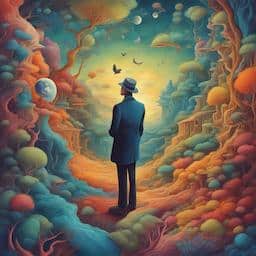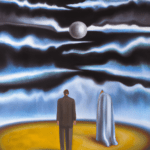Metaphysical fiction, also known as speculative fiction, is a genre that explores the nature of reality and the limits of human perception. It encompasses a wide range of literary works that deal with the paranormal, the supernatural, and the spiritual. The stories told in this genre often blur the line between reality and imagination, challenging readers to question their own assumptions about what is real and what is not.
Exploring the Nature of Reality

One of the most distinctive features of metaphysical fiction is its focus on the spiritual and supernatural aspects of reality. These elements are often woven into the fabric of the story, rather than presented as isolated phenomena. As a result, readers are forced to consider the possibility that there may be more to the world than what can be seen and touched.
Metaphysical fiction also tends to be highly philosophical in nature. Many works in this genre explore complex questions about the nature of reality, the meaning of life, and the relationship between the individual and the universe. These stories challenge readers to examine their own beliefs and assumptions about the world around them, and to consider the possibility that there may be deeper truths to be discovered.
One of the most famous examples of metaphysical fiction is the work of the Argentine writer Jorge Luis Borges. His short stories, such as “The Library of Babel” and “The Garden of Forking Paths,” explore the limits of human knowledge and the paradoxes that arise when we try to understand the world around us. Borges’ writing is characterized by its intricate and labyrinthine structure, as well as its focus on abstract concepts like time, space, and identity.
Another well-known example of metaphysical fiction is the work of Philip K. Dick. His novels, such as “Ubik” and “The Three Stigmata of Palmer Eldritch,” explore the relationship between technology and reality, and often feature characters who are struggling to distinguish between what is real and what is a product of their own imagination. Dick’s work is marked by its surreal and often hallucinatory imagery, as well as its themes of paranoia and existential dread.
Other notable writers in the genre include Italo Calvino, Haruki Murakami, and David Mitchell, all of whom have produced works that challenge readers to reexamine their assumptions about the world around them. Calvino’s “Invisible Cities” explores the relationship between imagination and reality, while Murakami’s “Hard-Boiled Wonderland and the End of the World” is a surreal and dreamlike meditation on the nature of consciousness. Mitchell’s “Cloud Atlas” weaves together multiple stories and time periods, creating a complex and multifaceted vision of the world that challenges readers to consider the interconnectedness of all things.
Despite the diversity of the works produced within the genre, all metaphysical fiction shares a common focus on the nature of reality and the limits of human perception. These stories ask us to consider the possibility that there may be more to the world than what we can see and touch, and challenge us to reexamine our own assumptions about the nature of reality.
At the heart of this exploration is the question of what it means to be human. Metaphysical fiction often presents characters who are struggling to understand their place in the universe, and who are forced to confront their own mortality and the limits of their own knowledge. These stories remind us that, for all our technological advancements and scientific knowledge, there is still much that we do not understand about the world around us.
In this sense, metaphysical fiction is not just a literary genre, but a way of approaching the world. By embracing the unknown and the unknowable, by questioning our own assumptions and beliefs, we open ourselves up to new possibilities and new ways of understanding the world around us.
Ultimately, metaphysical fiction reminds us that reality is a complex and multifaceted concept, and that our understanding of it is limited by our own perspectives and experiences. It encourages us to explore the mysteries of the universe, and to embrace the unknown and the inexplicable. By doing so, we may discover new truths about ourselves and the world around us, and come to a deeper understanding of the nature of reality itself.
Metaphysical fiction is a genre that explores the nature of reality and the limits of human perception. Through its focus on the spiritual and supernatural, its philosophical exploration of complex questions, and its challenge to readers to reexamine their own assumptions, this genre offers a unique and thought-provoking perspective on the world around us. As such, it is a valuable tool for those seeking to expand their understanding of reality and to explore the mysteries of the universe.
Keywords: Metaphysical fiction, speculative fiction, reality, perception, spirituality, supernatural, philosophy, Jorge Luis Borges, Philip K. Dick, Italo Calvino, Haruki Murakami, David Mitchell, consciousness, unknown, exploration, nature of reality, nature of reality in fiction, exploring the nature of reality, what is the nature of reality
Check out our Novel Writing Workbooks
Check out Little Tree Food Forest for articles on food forests and homesteading.
Check out FoodieScapes for articles on growing, fermenting and preserving food
Check out StoryScapes.World for articles on writing.
Subscribe to our newsletter to get information delivered to your inbox on how to write a book, outlining your novel, keeping journals, marketing your novel, self-publishing, writing poetry and more.










